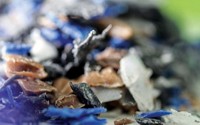Advertisement
Grab your lab coat. Let's get started
Welcome!
Welcome!
Create an account below to get 6 C&EN articles per month, receive newsletters and more - all free.
It seems this is your first time logging in online. Please enter the following information to continue.
As an ACS member you automatically get access to this site. All we need is few more details to create your reading experience.
Not you? Sign in with a different account.
Not you? Sign in with a different account.
ERROR 1
ERROR 1
ERROR 2
ERROR 2
ERROR 2
ERROR 2
ERROR 2
Password and Confirm password must match.
If you have an ACS member number, please enter it here so we can link this account to your membership. (optional)
ERROR 2
ACS values your privacy. By submitting your information, you are gaining access to C&EN and subscribing to our weekly newsletter. We use the information you provide to make your reading experience better, and we will never sell your data to third party members.
Environment
Polymer Sustainability Metrics Compared
Biopolymers rank high for green design, but petroleum-based polyolefins rank higher in overall life-cycle assessments
by Stephen K. Ritter
October 4, 2010
| A version of this story appeared in
Volume 88, Issue 40
The first study of petroleum-based versus biomass-derived polymers evaluated by comparing green chemistry and engineering design principles against life-cycle analysis (LCA) environmental impacts has found mixed results: Although biopolymers rank high in terms of green design, they exhibit relatively large environmental impacts from their production and are beaten by polyolefins in LCA rankings (Environ. Sci. Technol., DOI: 10.1021/es101640n). A team led by Amy E. Landis of the University of Pittsburgh evaluated a dozen polymers: seven derived from petroleum, four from biomass feedstocks, and one in part from both sources. The scientists analyzed parameters such as use of renewable resources, waste prevention, biodegradability, percent recycled, transportation, price, health hazards, and energy use. Ranked by green design, the biobased polymers polylactic acid and polyhydroxyalkanoate came out on top. But ranked by LCA, polypropylene and high-density polyethylene were at the top of the list. Complex polymers such as polycarbonate and polyvinyl chloride came out at or near the bottom in both rankings. The study’s authors conclude that adhering to green design principles reduces overall environmental impact for all types of polymers, but switching from petroleum feedstocks to biofeedstocks does not necessarily provide benefits.




Join the conversation
Contact the reporter
Submit a Letter to the Editor for publication
Engage with us on Twitter